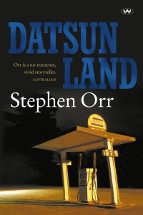Datsunland by Stephen Orr

Wakefield Press, 2017. ISBN 9781743054758
(Age: Year 12-Adult) Recommended. Short stories. This
extraordinary collection of short stories, written by David Orr, is
powerful as both story about, and analysis of, Australian life over
the years since European settlement. Orr depicts, in vivid and often
painful detail, the struggle for individuals and families trying to
cope with life, revealing the emotional responses to death, divorce,
inter-racial tension and disillusionment. He centres his vignettes
on the essential qualities of being human, particularly focusing on
the generosity, love, respect and loyalty that are at the basis of
being human. So, contrasting both kindness and nastiness, loyalty
and deception, in his various characters, he lays before us the
reasons why, being lost, lonely, discriminated against,
disillusioned or angry, they are angry, hurtful or evil, and why
they may have barely managed to survive in difficult times over the
centuries in the city, the small country towns or the suburbs of
rural and urban South Australia.
His sometimes interwoven stories reflect the issues from the times
of the early settlers to the modern world, focused on both children
and adults. We are drawn deftly into the worlds of the characters in
their experiences of unhappy marriages, of family disintegration and
separation, of unexpected and sometimes violent death, of the
after-effects of terrible childhoods, of war, and of the impact of
religious rules and disharmony. A religious institution features
more than once, in different stories of the lives of those dedicated
to education, particularly that of a Catholic religious brother who
has cared for, and lived with, a disabled woman who has no family.
Carefully, secretly never revealing her presence to anyone, he
supports her totally yet suffers terrible guilt for this choice. Orr
positions us to see him as he sees himself, as flawed and disloyal
to his religious vows yet correspondingly as a loving, devoted,
caring man. Other stories plunge us into lost, sad lives of
characters who are barely able to survive, or of those who struggle,
separated and lonely. Deliberately unsettling us, he disrupts our
ideas of what is good, and we are disturbed by his vivid depictions
of the sorrows, the terribly unhappy lives and the sometimes utterly
tragic circumstances of his characters.
Orr's writing is wonderfully rich in detail, his stories utterly
captivating, dramatic and disturbing, memorable for his vivid
language, his construction of time and place, and for the vivid
reality of the human condition. In his characters that are
chillingly real, sometimes good and sometimes utterly awful,
sometimes strong and often weak, in his eloquent, vivid and often
heart-rending stories, in his disturbingly accurate depiction of
time and place, he constructs worlds that are richly evocative of
both the past and present. In his interweaving of threads, his
appallingly sad stories captivate us, compelling us to read on, to
respond to the revelation of chillingly painful truths, as he
details the acts and thoughts of the disillusioned and the abused,
of the actions of both the good and evil characters, leaving us with
a disturbing sense of how little control we have of our lives.
Elizabeth Bondar